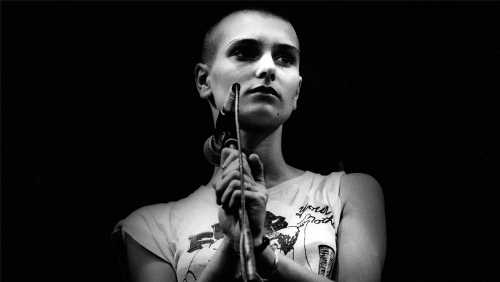
For all the great music she left behind, most of the public knows Sinead O’Connor for one moment: tearing up a photo of Pope John Paul II on “Saturday Night Live” in 1992, a move that was intended as a blunt statement on abuse in the Catholic church.
Not surprisingly, the move torpedoed her career and made her the object of vicious responses from the public and many celebrities — she was booed when she walked onstage at a Bob Dylan tribute concert just days after the incident — and the pillorying continued for many years, with the reaction to her statement changing only as the church’s countless, widespread abuses have become horrifyingly clear. While O’Connor, who died on July 26 at 56, had never been comfortable with the superstardom that followed her 1990 global smash cover of Prince’s “Nothing Compares 2 U,” the way she was treated was shocking at the time and, as Irish director Kathryn Ferguson’s 2022 documentary “Nothing Compares” shows, it’s exponentially more shocking now.
Ferguson, who filmed the interview with O’Connor that anchors the doc over a single weekend in 2019, spoke with Variety about the singer, her legacy, and the unfinished album she left behind.
(As told to Jazz Tangcay)
I’m very shocked, as we all are, and very, very sad that she’s gone. It’s been a very strange couple of days.
The reception for the film has been quite profound, actually, since it was released at Sundance in January 2022. It was a somewhat terrifying experience, releasing the film at that point, but very instantly, what became obvious was this huge avalanche of love for Sinead. It was so powerful and potent — we realized really quickly how many people she has touched around the world. This film took five years to make, but really, the seeds for it were sown when I was a teenager growing up in Ireland in the ‘90s.
She was amazingly supportive. It was so beautiful: She kept was posting constantly on Facebook about the doc and its journey, which was really heartwarming. I’m glad she got to see the response to it — that’s the only thing that’s remotely okay about all of this for me, that she was able to witness it.
We really wanted to look at why she did what she did, when she ripped up the picture of the Pope on “Saturday Night Live.” It caused so much confusion and vitriol, and I suppose the film was meant was to try and make sense of it — what led to this moment in her life? To do that, we had to go back to her trauma and the Ireland that spawned her, to a country that was traumatized — to really look at what caused this act. There was nothing random about it, it was a very visceral reaction to the information she’d been hearing. It was very, a very decisive act for her, but had this very long history to it. She was an abused child in Ireland — and she chose to use her platform and her power to speak up against what she deemed a huge evil in Ireland.
There just seemed to be a snowball effect in that mocking and reductive attitude towards her, and it lasted for six months. Watching it with audiences in the cinemas, that part of the film actually drew the largest gasps, because it’s still a horrendous thing to witness — this young woman being absolutely annihilated for essentially speaking out against abuse. It was horrible to find all of those moments, but we wanted it to be a truthful take on what she had to endure.
It was very hard to keep it to 97 minutes. We wanted it to be this very potent flash of time where you could really get a sense of what she went through. So for me, the most important thing we could do was letting her talk uninterrupted, for 97 minutes. And that’s the beauty and the power of the film.
At one point we were even considering Frankensteining lots of old interviews and Q&As and talk shows to create the narrative for our film, but then we realized what we had and how important it was that she was telling her own story from a contemporary point of view.
We’re not trying to make a grand statement that she’s changed the country, but you can bet your boots that the young people, the young activists that have gone on to change the country were hugely influenced by her, and her using her voice to speak out for the injustices that she witnessed.
For me, what’s really sad is that she did have an album that was nearly finished with Northern Irish composer and musician David Holmes. A few people I know who’ve heard it said it was astounding, and I was so looking forward to that being released and people responding to her music again. I really hope that that will come out at some point.
Read More About:
Source: Read Full Article